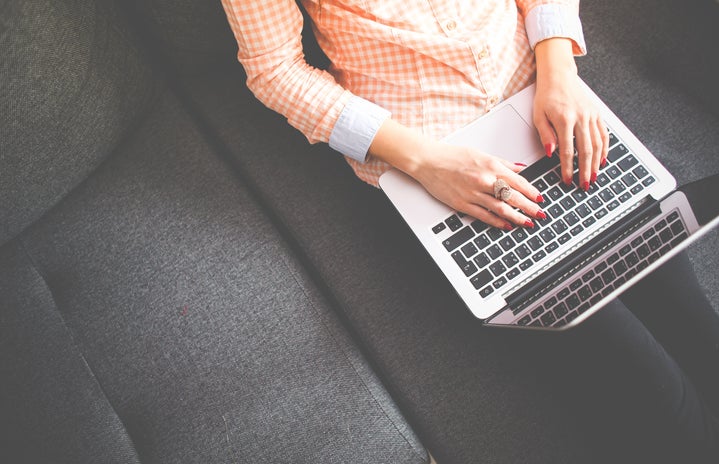Every collegiette knows (and dreads) the stress, exhaustion, and anxiety that comes along with finals week. Long nights and test-taking jitters are somewhat unavoidable aspects of college, but Her Campus is here to assure you that you can take your tests with confidence! We talked to Adam Shepard, author of The Best Four Years: How to Survive and Thrive in College (and Life), Bethany Stafford, author of College Studying Styles, as well as seasoned test-taking collegiettes and their friends to get the tips and tricks you need to ace your final exams, from now until test day!
Two weeks before your exam:
Start studying now
Putting off your studying sounds good today, but two weeks from now you’ll be regretting it. Be proactive and don’t let yourself fall victim to procrastination. Have free time now? Begin with the easy, preliminary stages of studying. Break it down: plan how each subject will be studied. “Make note cards or lists or highlight key material—whatever your study system suggests—but start it NOW. This will make your life much easier as test time approaches,” Shepard says.
Taylor, a junior at Boston University, says, “Waiting to start my studying was my biggest mistake as a freshman. My first semester, I waited until three days before my Religion final to crack down and it wasn’t until then I realized how much I really needed to memorize. Needless to say, I was disappointed with myself for putting it off. This semester I made my notecards throughout the semester and I’ve already put together some of my study guide. I’m in much better shape now.”
Take quizzes at the end of chapters:
Taking the quiz at the end of every chapter (if it’s an introductory course) will “give you greater insight to what you need to work harder on and what you have a greater grasp on,” says Stafford. These quizzes will instantly cue you into your strengths and weaknesses. If you feel like you totally understand and are confident with a certain chapter, skip it for right now and head straight to the concepts you’re struggling with.
Prepare your body
Finding time to exercise during finals week can be impossible, but Shepard says that it is essential to “eat right, sleep well, and exercise as you regularly would (whether that might means going for a walk or hitting the weights).” Physical activity helps produce endorphins, and with higher levels of endorphins we experience less of the negative side effects of stress. Stafford agrees. “Studying,” she says, “is all about balance. It’s individualistic. What works for you might be different for another person.” If you’re an avid athlete and exercise helps you relax, take that extra time to hit the gym. Stafford finds that if even if you’re not someone who exercises all the time, “a walk in nature can help make you feel at ease.” So although you feel overwhelmed with the excessive amount of studying that lies before you, take 30 minutes and head to the gym or take a walk. You’ll clear your head, feel refreshed once your workout is done, and head home feeling more motivated to conquer those flashcards.
Abigail, a senior at Lassell College, says, “During finals week I always make sure to work out in order to reduce my stress levels. I have found in the past that if I do not exercise I am not as productive with my studying! After a good workout my mind is clear and I am ready to focus.”
[pagebreak]
One week before your exam:
Prepare your environment:
You know by now what works for you and what doesn’t in a study environment. Music? Snacks? Particular lighting? Make sure it’s set up before you start your studying. The fewer interruptions, the better! Stafford suggests listening to classical music, or any music without lyrics. Try setting your Pandora station to Wolfgang Amadeus Mozart, Julian Bream, or Thelonious Monk. Make sure that your study environment is actually conducive to studying. Procrastinating is your worst enemy! Are you a social butterfly? Maybe the coffee shop isn’t such a good idea if you’re bound to run into your good friends. Are you a social networking junkie? Quit tweeting! And checking your Facebook does count as a distraction, so disable, disconnect, and move away from the computer. Eliminate all enablers!
Spenser, a sophomore at CU-Boulder, shares her tips: “To keep from procrastinating during finals week I go some place where I won’t be in constant contact with people I know. I will lock myself in my room or go to an empty classroom on campus. I only take out what I need to work on and put everything else away. I put on some music- I stick to low-key ambient kind of music, some jazz or reggae. Nothing that changes tempo too much or has a very different feel song to song.”
For Max, a student at Quinnipiac, the library is the best study space. “Although I love doing work outside on the quad on a 75 degree sunny day like today, that rarely works for productivity. I would say that the place I’m most productive is the library in one of the little cubbies that they have there. It’s my own space and for whatever reason, I get in the zone when I’m in one. I can do work in my apartment but I feel like there are too many distractions and things for me to use as procrastination tools like the fridge and TV.”
Take advantage of review sessions:
Utilize the resources your campus provides! Stafford says that you can definitely use review sessions to your advantage. Most professors will touch on certain topics more heavily than others in review sessions. This is a good indicator of what will be on the exam! Professors and TAs love when students take advantage of office hours. You’ll get greater insight and demonstrate your motivation to do well!
Study in short bursts:
Shepard believes that the best way to study is in short periods of time. “Studying in 45-minute sessions with a 15-minute break, for example, does two things. One, it allows you to pound a lot of information into your head and then let it digest (while you’re taking the 15-minute break), rather than risking overload if you study straight through. Two, it motivates you to stay focused—‘Okay, I’ve got 45-minutes to be serious, and then I can take a break’—instead of dreading the long night ahead of incessant studying.”
Review with a classmate:
Ask the person you always sit next to in lecture if he or she would be up for a joint study session. Quiz each other and ask each other questions; “This will enable you to mix up your study routine,” Shepard says, “but, more importantly, you are likely to pick up on material that you might not get on your own.”
Teach what you’ve learned to someone else:
My Psych 101 professor told us freshman year that to improve our memory we should attempt to teach someone else what we are trying to learn and memorize. It’s a study technique I’ve used ever since! This will force you to be comfortable with the material—you won’t just be memorizing words, you will be understanding concepts, theories, and be able to thoroughly explain them. Finding a friend who has the time and is willing to listen to your difficult study guide is a challenge. Instead, I close my books, laptop, and put away my notecards and give a presentation to, well, my living room. As long as you feel comfortable enough with the material to teach it to someone new, you’re ready!
Alex, a student at BU, says, “I think it helps to study with others because when I learn the material, it helps me to repeat the information in a teacher-like manner. It stays me with me better. Also, studying with others is nice because it helps to have a double-team effort when attacking the study material!”
[pagebreak]
One night before exam:
Review the night before:
This doesn’t mean pulling an all-nighter or cramming material you don’t understand. Stafford warns that cramming will “create unneeded anxiety because you know you did it last minute.” Instead, Shepard says to take the night before to “use the notes you’ve been preparing, and review them religiously.” If you’ve stayed on top of your work and prepared throughout the entire semester, you will be able to recall information as it is more embedded. Relax, be confident, and review, review, review!
Get your eight hours of sleep:
Shephard warns, you shouldn’t “neglect your body in your attempt to cram. A well-rested body is at least AS important as those last flips through your notes.” You know it’s time to sleep when “resting your eyes” sounds like a good idea, and you’ve started attributing your continuous yawns to “not enough oxygen.” Put your books away and call it a night!
Day of exam:
Arrive early:
Stafford suggests arriving to the exam room early so you can “get comfortable with your surroundings and you don’t feel rushed.” If you usually grab Starbucks every morning, make sure you have time to do so. Maintaining your normal daily routine is essential to eliminating any unnecessary stress!
Stay calm:
Test-taking anxiety is common. And Stafford suggests that if you “feel you get anxiety during every exam you take, blank out, get hot, and can’t concentrate, you may suffer from test anxiety.” There are remedies for this. Check out your student resource center to see a counselor. This way you’ll learn how to focus on every exam! But if your jitters are just temporary and you need instant stress relief, breathe, stretch, and relax—keep in mind you’ll be done with the class completely in less than three hours!
Good luck, collegiettes! We know you’ll do awesome. Share your own test-taking tips below!
Sources
Taylor, Boston University
Alex, Boston University
Spencer, University of Colorado, Boulder
Max, Quinnipiac University
Abigail, Lasell College
Adam Shepard, The Best Four Years: How to Survive and Thrive in College (and Life)
Bethany Stafford, College Studying Styles
www.CollegeStudyingStyles.com
www.twitter.com/collegestudying

